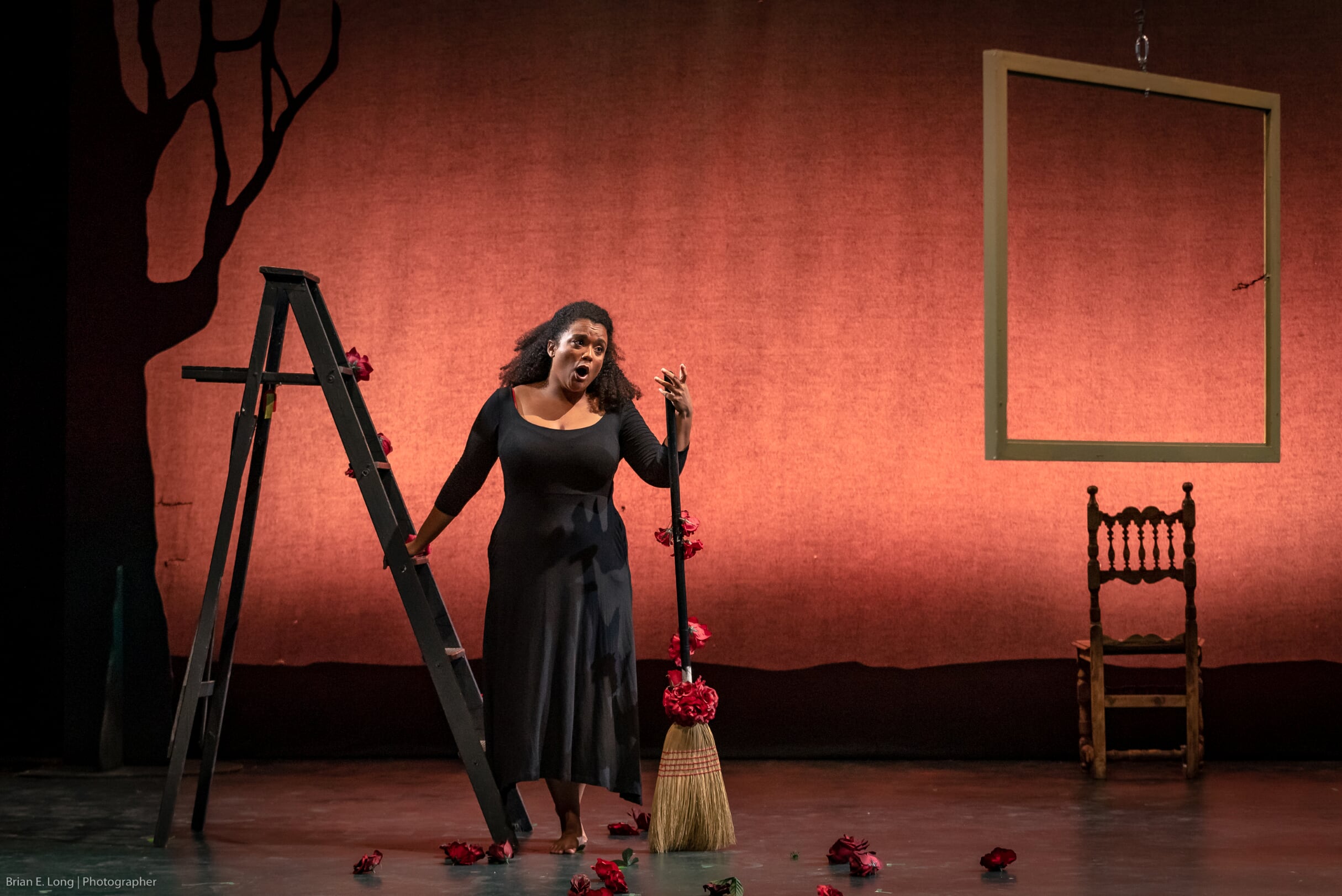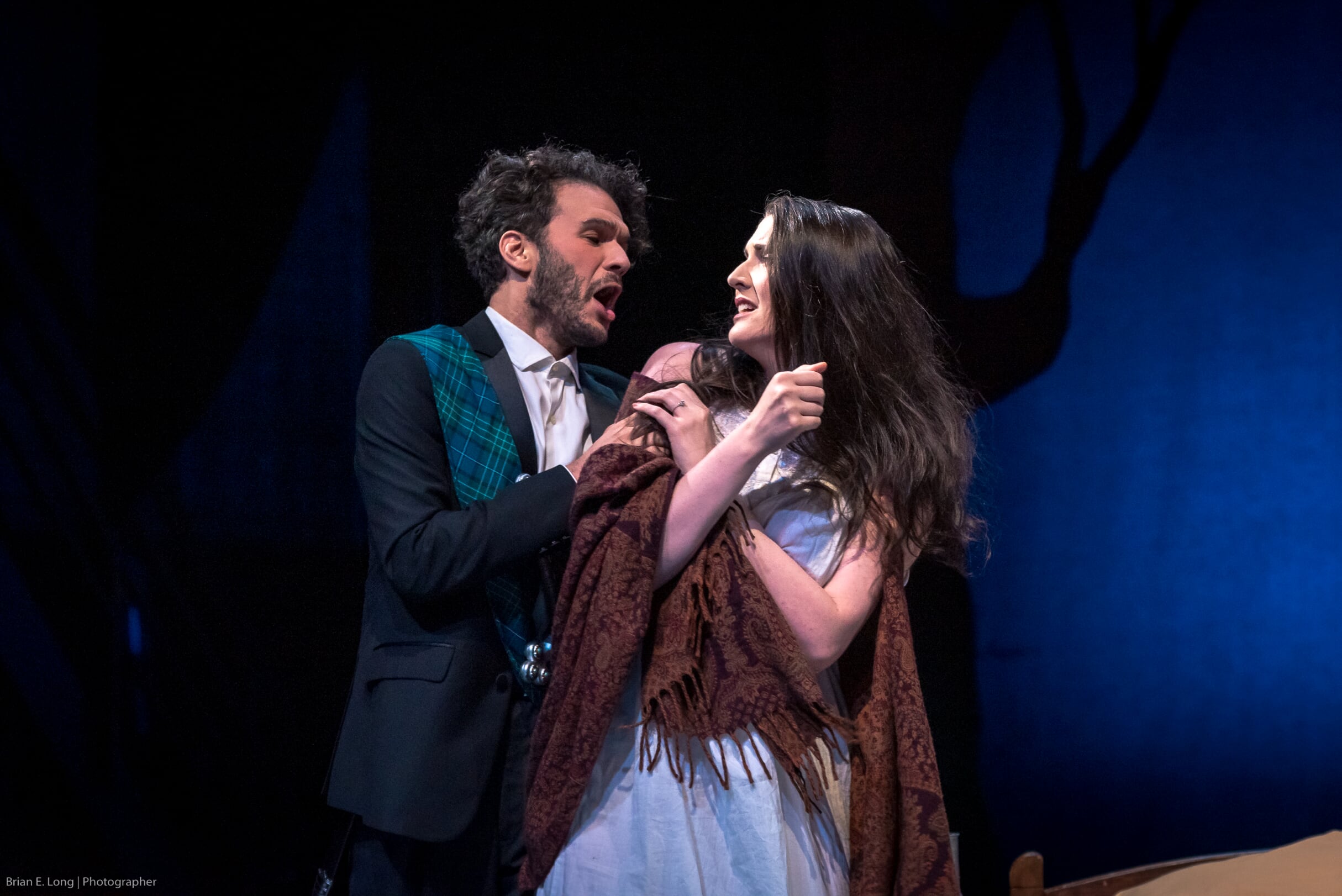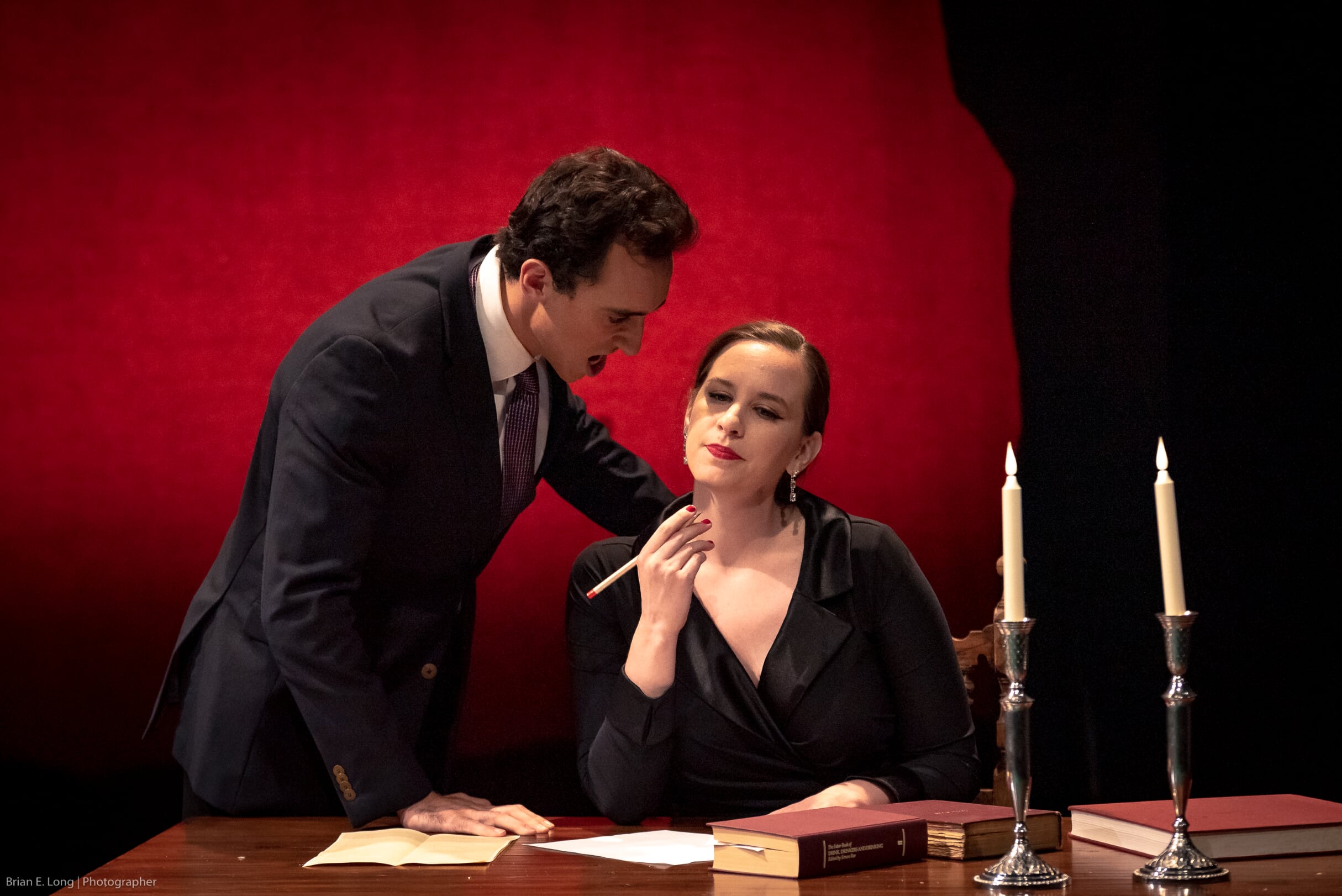2019 is turning out to be a red-letter year for women composers, with new initiatives cropping up in droves alongside the rediscovery of, and belated recognition for, historical works by composers whose sex generally counted against them in their day. This mini Festival care of the pioneering Dell’Arte Opera Ensemble – a group dedicated to providing emerging artists with training and performance opportunities to help bridge the gap between conservatory and a professional career – was no exception, offering work from the very beginnings of the art form (on a previous evening, Francesca Caccini’s 1625 opera La Liberazione di Ruggiero) all the way up to today. In particular, it gave us the chance to hear an excerpt from Victoria Bond’s intriguing Mrs. President, a new opera set to a libretto by Australian writer Hilary Bell.
 MaKayla McDonald as Marie in Viardot’s Cendrillon. Photo © Brian Long
MaKayla McDonald as Marie in Viardot’s Cendrillon. Photo © Brian Long
The third of four Festival programs, Scenes from the Tower covered three centuries of opera by women, from the 19th-century soirées of Pauline Viardot (her charming Cendrillon), through Thea Musgrave’s 20th-century Mary Queen of Scots (most of the third and final act), and right up to the latest 21st-century sensibilities of the aforementioned Bond and Bell.
Viardot was quite a phenomenon. Friend of Chopin, Liszt and Wagner, and lover of Ivan Turgenev whose stylistic fingerprints are all over the libretto for Cendrillon, she outlived most of her contemporaries to die in Paris in 1910. Her music, for what is a pretty straightforward telling of the Cinderella story, is a delightful mix of the salon with echoes of Offenbach, plenty of waltz songs, and the occasional moody tug of Chopin, especially in the thematically engaging Overture and the mazurka that crowns the ballroom scene (Viardot famously toured with arrangements of some of Chopin’s mazurkas turned into popular songs). She even manages to quote The Ride of the Valkyries as Cinders’ horses champ at the bit.
Neatly staged on Jessie Chen’s uncluttered, stylish set, with simple yet effective costumes (Heather Denny) and matching lighting (Eric Haufschild), it gave the young artists plenty of scope to charm, which on the whole they did. MaKayla McDonald displayed the strongest vocals as Marie (the Cendrillon character) and won more hearts than just the Prince with her warmly engaging persona. Jessica Harika and Kristina Malinauskaite made the most of the selfish, air-headed sisters Armelinde and Maguelonne, while Heather Bobeck impressed as the Fairy Godmother, especially with a late-in-the-day burst of coloratura soprano. As Le Comte Barigoule (the Dandini character), Tyler Dobies proved an adept musical actor, his natural manner standing out among rather too much stock operatic gesticulating. Brian Alvarado made a sonorous Le Baron de Pictordu with Cory Gross a mellifluous Prince Charmant.
 Lisa Faieta as Mary and Gabriel Hernandez as Bothwell in Musgrave’s Mary, Queen of Scots. Photo © Brian Long
Lisa Faieta as Mary and Gabriel Hernandez as Bothwell in Musgrave’s Mary, Queen of Scots. Photo © Brian Long
Thea Musgrave (90 this year and still going strong) has an impressive opera CV, with 10 currently to her name. Mary, Queen of Scots hails from 1977 and represents a Scottish woman’s take on a too-often over-romanticised historical figure. Musgrave’s lyrical libretto sits well, set off by her spiky, harmonically pungent, and entirely unsentimental musical language. Act III finds Mary, ever the self-aware pragmatist, desperate to find a solution to her political impasse. Caught between her ineffectual drunken husband Darnley, her ambitious brother James, and the equally ambitious Bothwell, Mary miscalculates to disastrous effect leading to a series of charged one-on-one encounters.
Performances were strong, with Lisa Faieta especially impressive as a powerful-voiced Mary. Gabriel Hernandez was a preening Earl of Bothwell with plenty of vocal heft at the top, well matched by Connor Lidell’s puffed-up, prowling James Stewart. Andrea Howland Myers blended nicely with Faieta in the touching lullaby scene. Emily Bishai’s direction was clear and effective, as was Whitney George’s conducting, though Musgrave’s intricate score lost rather too much colour in its piano-only version.
Mrs. President could also have benefitted from more than just piano accompaniment. Bond’s score is full of melodic gestures that burst into lyrical blossoms, and her musical language is approachable and direct, but beneath the musical textures one could sense an orchestration desperate to get out. That said, she’s a fine setter of words, and in Bell she’s clearly found an effective collaborator whose text is direct, sufficiently poetic, and – crucially – easily musically malleable.
 Anna Woiwood as Victoria Woodhull and Geddy Warner as Henry Ward Beecher in Bond’s Mrs. President. Photo © Brian Long
Anna Woiwood as Victoria Woodhull and Geddy Warner as Henry Ward Beecher in Bond’s Mrs. President. Photo © Brian Long
In 2019, with Hilary Clinton’s run still seen by many as a lost opportunity, it’s surprising to look back at history and come across the story of Victoria Woodhull, a woman who ran for president of the United States in 1872, decades before any woman would even have the right to vote. The presented scene from the first act of Mrs. President shows Victoria interrupting a séance (a satisfyingly rich and complex vocal nonet) to announce that she is founding a newspaper to promote her liberal views on female emancipation, the rights of former slaves, and, more controversially free love.
When one of her followers, Isabella Beecher, suggests that her brother Henry Ward Beecher might be persuaded to support the cause, Victoria reveals that Beecher, a firebrand preacher, is seducing his female parishioners on the side leading to a confrontation between preacher and editor in Victoria’s office. Confronted with a ready-to-print story, the at first furious Beecher begs for mercy, only for Victoria to suggest he joins her crusade for free love. In an unexpected twist, they fall passionately onto the desk, their whispered endearments bringing their love duet to an original conclusion.
Storytelling here was well-defined with several intriguing digressions hinting at relationships past and future. Again, simply and cleverly staged, the young singers were led by Anna Woiwood as a strident, charismatic Victoria Woodhull and a bright-toned Geddy Warner as the stuffed-shirt preacher. Tyler Dobies did sterling dramatic service again as one of Victoria’s cast-off lovers.
On this showing, Mrs. President is a work that deserves a full staging – perhaps in the run up to a Warren or Harris presidential bid?













Comments
Log in to join the conversation.